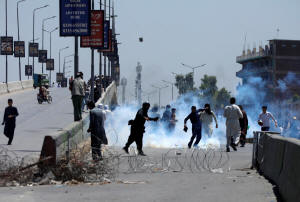Pakistanís deepening political crisis douses hopes for IMF relief
 Send a link to a friend
Send a link to a friend
 [May 10, 2023] By
Karin Strohecker, Jorgelina do Rosario and Ariba Shahid [May 10, 2023] By
Karin Strohecker, Jorgelina do Rosario and Ariba Shahid
LONDON/KARACHI (Reuters) - The political crisis engulfing Pakistan is
eroding hopes that the South Asian country can get its much needed
programme with the International Monetary Fund back on track soon and
escape a full-blown debt crunch, analysts said.
Violent clashes between supporters of Imran Khan and police broke out
across the country after Pakistan's anti-corruption agency arrested the
former prime minister on Tuesday.
The latest rupture in Pakistan's febrile politics comes as the
230-million-population nation prepares to hold tightly fought elections
in the autumn while facing its worst economic crisis in decades, with
dwindling reserves and a stalled $6.5 billion IMF programme that is
expiring in June and scarce other financing sources in sight.
"With protesters on the streets, the IMF will be even more wary about
restarting the loan deal," said Gareth Leather, senior economist for
Emerging Asia at Capital Economics.
The turmoil since Khan was ousted just over a year ago has scarred the
country's economy and markets.

Pakistan's rupee has lost nearly 50% over the past 12 months. The main
stock index has suffered a double-digit decline over the same period.
On Wednesday, the rupee tumbled to a fresh record low of 289.5 to the
dollar. The country's international bonds, already in deeply distressed
territory of as little as 32 cents, dropped more than 1 cent in the
dollar on the day.
JPMorgan analyst Milo Gunasinghe said little relief from political
uncertainty was in sight while the IMF programme remained stalled.
"The latest developments likely dampen any prospect of a political
breakthrough across both sides," Milo said.
The bank recently lowered its 2023 growth forecast for the country from
1.3% to 0.1% and warned of "stagflation shock" due to delays in the IMF
talks, while the central bank hiked its key interest rate to a record
21% to fight double-digit inflation.
[to top of second column] |

Supporters of Pakistan's former Prime
Minister Imran Khan throw stones towards police during a protest
against Khan's arrest, in Peshawar, Pakistan, May 10, 2023. REUTERS/Fayaz
Aziz

The nuclear-armed nation faces the risk of a default unless it
receives massive support. The gross public debt-to-GDP ratio stands
at 73.5%, according to government data as of December. Foreign
exchange reserves at $4.457 billion cover barely a month's worth of
imports.
"The IMF has the capacity and the flexibility to help member
counties in a variety of political circumstances," said Reza Baqir,
former central bank governor of Pakistan and global head of
sovereign advisory services at Alvarez and Marsal.
"It is usually up to the country to present a credible plan of
policies and financing that, in the face of political uncertainty,
will credibly address the membersí balance of payment problems."
The armed forces remain Pakistan's most powerful institution, having
ruled directly for close to half the country's 75-year history
through three coups.
Hasnain Malik, head of equity research at London-based Tellimer,
added that unless martial law was imposed, there was no reason for
the IMF to suspend discussions.
"However, instances of violence likely justify a postponement in the
election and make credibly committing to painful fiscal cuts even
harder," he said.
(Reporting by Karin Strohecker and Jorgelina do Rosario in London,
and Ariba Shahid in Karachi, Editing by Nick Macfie)
[© 2023 Thomson Reuters. All rights
reserved.]
This material may not be published,
broadcast, rewritten or redistributed.
Thompson Reuters is solely responsible for this content.
 |